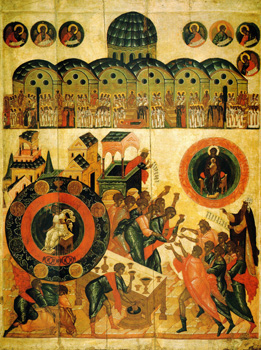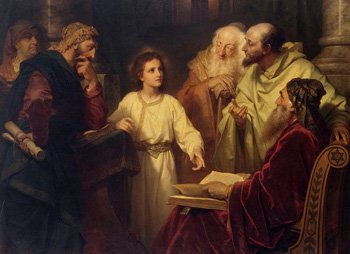For Sunday January 2, 2022
Lectionary Readings (Revised Common Lectionary, Year C)
Sirach 24:1-12
Wisdom 10:15-21
Ephesians 1:3-14
John 1:(1-9), 10-18
NOTE: Our lectionary essay this week is written by Michael Fitzpatrick. Debie is on a much deserved vacation, and will return to the lectionary essays January 2nd.
As a philosophy instructor, I often help my students get a grasp of my discipline by appeal to the word’s etymological parts. Philo, one of the Greek terms for love, and sophia, or wisdom. Thinking of philosophy as the “love of wisdom” is a little less intimidating, and easier to remember. Yet several of my students have pointed out that the phrase feels very foreign to them. Besides the act of loving wisdom not being a regular social value, where in society are we really encouraged to have an attitude towards wisdom at all, loving or otherwise? Wisdom is just not something regularly celebrated in privileged Western societies as a basic human good. Skill, expertise, success, high salaries, stock IPOs — these are the human goals we’re typically taught to strive for. Even in more thoughtful contexts the emphasis is more on well-being, such as mindfulness, calm, peacefulness, or detachment. Who today is really telling us that we should pursue wisdom in our lives?
Perhaps that is why I love these particular RCL lectionary readings. Taken together, they place Christ and wisdom side-by-side in such visceral, dramatic ways that enable us moderns to rediscover an ancient tradition of seeing Christ as the incarnation of God’s Wisdom. I want to draw out three remarkable insights into wisdom we can gain from these readings. Let’s begin with our reading from the apocryphal book “The Wisdom of Yeshua and Ben Sirach.”
Like the book of the Proverbs, Sirach imagines the Wisdom of the Almighty as a personification of God’s being. She is a powerful woman who presents herself before the whole gathering of the Lord’s throne room, but unlike all other powers and principalities, she speaks to the heavenly hosts of her own glory. Since only the Living God can be worthy of glory, she indisputably presents herself as one with the Creator. She is the Word spoken from God’s own mouth (v. 3), her throne is in the highest heavens (v. 4), and she alone contains the highest heights and the deepest depths (v. 5). Establishing her place alongside the Creator, she claims for herself possession of all waters and all lands, all nations and all peoples (v. 6).
After this proclamation of her glory, we learn about Wisdom that:
 |
|
"Divine Wisdom" by Shiloh Sophia McCloud.
|
(1) She comes from without.
Verses 8–12 describe how Wisdom settled amongst the people of Israel at the Creator’s instruction, a people who is God's own “portion,” the Lord’s chosen legacy. Nowhere is it suggested God gifted Wisdom to the people of Israel out of merit. They weren’t smarter, or more hard working, or possessing greater virtue than surrounding nations and ethnic communities (far from it, in fact). But it wouldn’t matter even if they had these accolades. Wisdom is not earned, Wisdom is not a product of great learning or exemplar behavior or keeping all the commandments. Wisdom is God’s gift that a people is to look for and receive, not aspire to and achieve.
The “Wisdom of Solomon” is another apocryphal book written not by the historical Solomon, but rather by Jewish theologians shortly before the birth of Christ who wanted to present the Jewish alternative to the wisdom of Greek philosophy. Here Wisdom is, astonishingly, presented as the very agent of Israel’s deliverance during the Exodus. In other words, concerning Wisdom:
(2) She is the creating, saving acts of God.
It is Wisdom who works in Moses to oppose the Pharaoh (v. 16), who throws up a cloud by day and a pillar of fire by night (v. 17), who parts the Red Sea for the People of God but drowns the Egyptian army (vv. 18–19). Given that in the next breath the text praises the Almighty directly for “your defending hand” (v. 20), the equation of Wisdom with the deeds of God is undeniable. Wisdom is not located within rational argument or perceptive insight or mindfulness meditation. What is wise simply is what the Lord has done. The Creator is the one who delivers chosen peoples from the hands of the oppressor; the Creator is a saving god. And the means by which the Creator is Savior is through the incarnation of Wisdom in the world of the people precious to the Creator.
 |
|
"Wisdom hath built her house" Russian Orthodox fresco.
|
Which leads to the marvelous parallel between these words and St. Paul’s letter to the parish in Ephesus. Just as the Holy One chose Israel before the foundation of the world to be the vessel of Wisdom, so God chose those already united with Christ before the foundation of the world to be saved through Christ. Christ also comes from without, a gift unearned. Christ must come unearned, since “before the foundations of the world” no one was around to merit anything! Christ is presented as the exemplar saving act of God — “In him we have redemption through his blood, the forgiveness of our trespasses, according to the riches of grace that Almighty God has lavished on us” (vv. 7-8). And in the next breath we learn that “with all Wisdom” God has sent the Christ in the fullness of time. So we can draw out our third point about Wisdom:
(3) She is the fullness of God dwelt bodily in Christ Jesus our Lord.
This beautiful, beautiful Christ is the living, breathing incarnation of God’s Wisdom. It is through her that Christ makes possible our adoption into the family of the Creator. It is through her that Christ marks us with the seal of the Holy Spirit. It is through her that all things in heaven and in the earth are gathered together into Christ. When we see Christ as the culmination of Israel’s history of Wisdom incarnate in the world, that she is the Word from God’s own mouth who was in the beginning with God and who was God, how much more fitting is the prologue of John’s Gospel! Of course what has come into being through her was a life that would be a light to all people! Of course Wisdom is a light that no darkness can overcome! Wisdom is a true light that enlightens everyone.
 |
|
"Jesus in the temple" by Heinrich Hofmann.
|
But Wisdom is no abstraction, and in the Hebrew scriptures never was. Wisdom is always the living, breathing essence of God’s goodness acting concretely in physical spaces. How fitting that this Wisdom would become flesh and live amongst us shining out the glory of the Living God as a firstborn son imaged his father in the culture of the ancient near east. Wisdom is the Almighty come in the flesh, sometimes “pitching a tent” with the People of God, and in the fullness of time as the Creator’s true plenipotentiary in the life of a Jewish peasant. She is Emmanuel, God with us, seen in the very face of the Christ we confess as Lord and Savior.
As we celebrate the final few days of Christmastide, let us contemplate how our creating, saving God is calling us forth to be lovers of Wisdom — not some far off ideal but the ever present reality of the divine in the flesh, born in the acts of the Almighty, born of a virgin. Let us pray to throw off the goals of life set by this world and pursue Wisdom, our inheritance toward redemption as God’s own people. And finally, may we let Wisdom stand in our midst as she does amidst the hosts of heaven, and speak to us of her glory.
Michael Fitzpatrick welcomes comments and questions via m.c.fitzpatrick@outlook.com
Image credits: (1) Fine Art America; (2) Wikipedia.org; and (3) Wikipedia.org.





